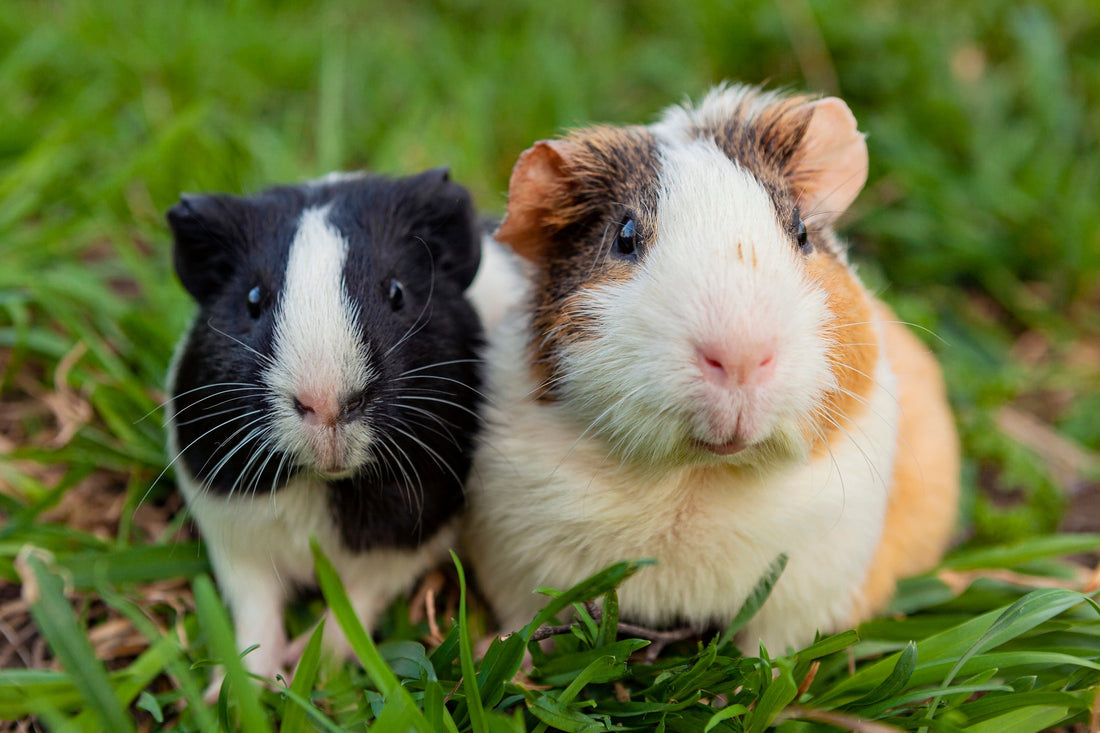
If you’re a proud guinea pig parent, you’ve probably heard that hay is essential for your furry friend’s health. But why is hay important for guinea pigs, and what happens if they don’t eat enough of it? In this guide, we’ll cover everything you need to know — from its nutritional benefits to the different types of hay to help you find the best hay for guinea pigs.
Why Do Guinea Pigs Need Hay?
Hay isn’t just a treat — it should make up around 80–90% of a guinea pig’s daily diet. These gentle grazers rely on a constant supply of high-fibre hay to stay healthy and active. It supports digestion, dental care, and mental stimulation, forming the foundation of a balanced guinea pig diet.
Hay Is the Foundation of a Guinea Pig’s Diet
Hay is essential for healthy digestion. Guinea pigs are herbivores designed to graze continuously, and hay provides the rough fibre their digestive systems need to keep things moving smoothly.
Without enough fibre, guinea pigs can develop serious digestive issues such as:
- Bloating
- Constipation
- Gastrointestinal stasis — a painful and potentially life-threatening condition
A steady supply of hay keeps their gut bacteria balanced, ensuring healthy digestion and nutrient absorption.

Hay Is Essential for Guinea Pig Teeth
Did you know a guinea pig’s teeth never stop growing? Chewing on hay helps naturally wear them down, preventing malocclusion (overgrown teeth).
Without hay:
- Teeth can become uneven or too long
- Eating becomes painful
- Drooling, weight loss, or mouth injuries may occur
Soft veggies or pellets alone aren’t enough — only coarse hay fibres provide the resistance needed to keep teeth properly trimmed.
Hay Is Essential for Mental Enrichment
High-quality hay especially Timothy hay offers more than fibre. It provides nutrients, natural scent, and texture that encourage guinea pigs to explore, burrow, and forage.
This mental enrichment keeps them happy and reduces stress or boredom. Mixing hay varieties such as meadow hay, orchard grass, or oat hay can make feeding time fun and flavourful while supporting healthy eating habits.
How Much Hay Should a Guinea Pig Eat Daily?
The answer: as much as they want!
Guinea pigs should have unlimited access to hay 24/7. They nibble throughout the day and night, and this constant chewing supports both digestion and dental health.
Tips to Encourage Hay Consumption
- Use a hay rack or hay bag to keep it clean and dry.
- Offer a mix of hay types for variety.
- Replace hay daily to keep it fresh and appealing.
What Happens If Guinea Pigs Don’t Eat Enough Hay?
If your guinea pig isn’t eating enough hay, you might notice:
- Weight loss
- Small, dry, or soft droppings
- Drooling or overgrown teeth
- Lethargy or poor appetite
These are warning signs — contact your vet immediately. A guinea pig that stops eating hay could develop serious health problems within days.
What Is the Best Hay for Guinea Pigs?
When it comes to choosing hay, there’s plenty to pick from — but not all hay is nutritionally equal. Here are the most popular and beneficial types for guinea pigs:
Timothy Hay
Timothy Hay is the most common and well-known choice for guinea pigs — and for good reason. Timothy Hay is a high-quality, green, and aromatic hay packed with the right balance of fibre, protein, and nutrients that support digestion and dental health.
Timothy hay is ideal for daily feeding, as it’s low in calcium (reducing the risk of bladder stones) but high in fibre to keep the gut healthy. You can find several cuts of Timothy hay, each with a slightly different texture and nutritional profile.
- First Cut: Coarse and fibrous — great for dental wear.
- Second Cut: A balanced texture with a mix of soft leaves and stems — perfect for everyday feeding.
- Third Cut: Softer and leafier — ideal for picky eaters or guinea pigs that prefer tender hay.

Meadow Hay
Meadow Hay is a natural blend of grasses and wild plants, making it aromatic and diverse in texture. It’s excellent for encouraging natural foraging behaviour and providing variety in your guinea pig’s diet. However, as its composition can vary seasonally, it’s best used alongside other hay types to ensure consistent nutrition.
Orchard Grass Hay
Orchard Grass Hay is soft, sweet-smelling, and gentle on the mouth — a great option for guinea pigs who find Timothy hay too coarse. It’s also lower in calcium and dust, making it perfect for sensitive pigs or those prone to respiratory issues.
Alfalfa Hay
Alfalfa Hay is richer and denser than grass hays, packed with protein, calcium, and energy. It’s best suited for young, pregnant, or nursing guinea pigs who need the extra nutrients for growth and recovery. Adult guinea pigs, however, should have it only as an occasional treat due to its high calcium content.
Oat Hay
Oat Hay has a slightly crunchy texture with long, fibrous stems and seed heads that guinea pigs love to chew. It’s fantastic for keeping teeth worn down and adding variety to their daily hay mix. Plus, it’s high in fibre and appealingly fragrant.
Ryegrass Hay
Ryegrass Hay is another nutritious option that helps maintain dental health due to its thicker strands. It’s often included in meadow or mixed hays and provides excellent roughage to support healthy digestion.
Tip: Always choose fresh, green hay that smells sweet and is free from dust or mould. Store it in a cool, dry place away from sunlight to preserve nutrients and freshness.
Final Thoughts: Hay Equals Health
High-quality, nutritious hay plays a vital role in your guinea pig’s overall wellbeing. It supports digestion, keeps teeth in check, and provides mental stimulation every day.
In short:
No hay = no healthy guinea pig.
Provide your pet with unlimited, high-quality hay daily, and you’ll ensure a long, happy, and healthy life for your little companion.

